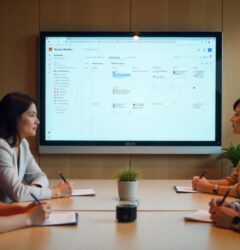- Email: [email protected]
- phone: +44 (0) 203 916 5117
02 Jan

Event management platforms are essential tools for event planners, providing powerful features and functionalities to streamline the entire event management process from planning to execution. These platforms have become increasingly popular in recent years, as they help event planners to manage their events more efficiently and effectively. However, with so many event management platforms available in the market, it can be challenging to choose the right one for your event.

To help you make an informed decision, this article will cover the essential features of a successful event management platform. These features include core functionalities, engagement and marketing tools, data management and analytics, user experience, support and scalability, and integrations and extensions. By understanding these features, you can choose an event management platform that best suits your needs and helps you to plan and execute successful events.
One of the bonus features that can help improve event footfalls and turnouts is the use of calendar invites. By using Let's Calendar, readers can send calendar invites and block visitors' calendars with event information. This feature ensures that attendees are reminded of the event and can easily add it to their calendar, increasing the likelihood of attendance.
Key Takeaways
- Essential features of a successful event management platform include core functionalities, engagement and marketing tools, data management and analytics, user experience, support and scalability, and integrations and extensions.
- Using Let's Calendar to send calendar invites and block visitors' calendars with event information can improve event footfalls and turnouts.
- Choosing the right event management platform is crucial for event planners to manage their events more efficiently and effectively.
Understanding Event Management Platforms
Defining Event Management Software
Event management software is a type of technology used to plan, organize, and manage events. It is a comprehensive solution that can help event planners manage all aspects of their events, from registration and ticketing to marketing and promotion. Event management software can be used for physical, virtual, or hybrid events, and it is designed to simplify the event planning process and improve the overall experience for both attendees and organizers.
Evolution of Event Planning Tools
Event planning has come a long way since the days of pen and paper. Today, event management platforms offer a wide range of features and tools that make event planning more efficient and effective. Some of the earliest event planning tools were simple spreadsheets and databases that helped organizers keep track of attendees and other important details. However, these tools were limited in their capabilities, and as events became more complex, event planners needed more sophisticated solutions.
Over time, event management software evolved to include features like online registration, ticketing, and payment processing. Today, event management platforms offer a wide range of features, including marketing and promotion tools, attendee management tools, and analytics and reporting tools. These platforms provide event planners with powerful tools and features to streamline the entire event management process, from planning to execution.
Let's Calendar
Let's Calendar is an event management platform that offers a range of features to help event planners manage their events more effectively. One of the key features of Let's Calendar is the ability to send calendar invites and block visitors' calendars with event information. This can help improve event footfalls and turnouts by ensuring that attendees have all the information they need about the event, including the date, time, and location. To send a calendar invite with Let's Calendar, simply create an event and select the "Send Calendar Invite" option. To block visitors' calendars with event information, select the "Block Visitor's Calendar" option.
Core Functionalities
A successful event management platform should have core functionalities that enable event planners to manage their events efficiently. These functionalities include Registration and Ticketing Essentials, Comprehensive Event Scheduling, and Integrated Payment Solutions.
Registration and Ticketing Essentials
Registration and ticketing are essential features of an event management platform. The platform should allow event planners to create customizable registration forms and ticketing options, which can be easily integrated into their website. Attendees should be able to register and purchase tickets online, and the platform should provide real-time updates on the number of tickets sold and available.
Some platforms offer additional features such as early bird pricing, group discounts, and promo codes to help event planners increase ticket sales. The platform should also allow event planners to collect attendee data such as name, email address, and phone number, which can be used for post-event follow-up and marketing.
Comprehensive Event Scheduling
Comprehensive event scheduling is another core functionality of an event management platform. The platform should allow event planners to create and manage event schedules, including sessions, speakers, and locations. The platform should also provide attendees with access to the event schedule, which can be viewed on their mobile devices.
Some platforms offer additional features such as session ratings and feedback, which can be used to improve future events. The platform should also allow event planners to make last-minute changes to the schedule, which can be communicated to attendees in real-time.
Integrated Payment Solutions
Integrated payment solutions are essential for event planners who want to manage their finances efficiently. The platform should allow event planners to accept payments online, including credit card payments and PayPal. The platform should also provide real-time updates on payments received and outstanding.
Some platforms offer additional features such as automatic invoicing and payment reminders, which can help event planners manage their cash flow. The platform should also provide event planners with access to financial reports, which can be used for accounting and tax purposes.
To send calendar invites and block visitors' calendars with event information, event planners can use Let's Calendar. The platform allows event planners to create and send calendar invites to attendees, which can be customized with event information such as date, time, location, and agenda. The platform also allows event planners to block visitors' calendars with event information, which can help improve event footfalls and turnouts.
In conclusion, a successful event management platform should have core functionalities such as registration and ticketing essentials, comprehensive event scheduling, and integrated payment solutions. These functionalities can help event planners manage their events efficiently and improve attendee experience.
Engagement and Marketing
Successful event management platforms offer a suite of features to help event organizers increase attendee engagement and promote their events effectively. The following subsections highlight some of the essential features that an event management platform should have to maximize attendee engagement and event promotion.
Maximizing Attendee Engagement
An event management platform should provide features that help organizers keep attendees engaged before, during, and after the event. These features can include customizable event registration and ticketing, attendee communication and engagement tools, mobile app integration, and more. By providing attendees with a seamless and engaging experience, organizers can ensure that they return to future events.
Effective Event Promotion
Event promotion is a critical aspect of event management, and an event management platform must provide a suite of marketing tools to help organizers promote their events effectively. These tools can include email marketing, social media integration, event marketing, and more. By leveraging these tools, organizers can reach a broader audience and attract more attendees to their events.
Leveraging Email and Social Media Marketing
Email and social media marketing are two of the most effective ways to promote events and increase attendee engagement. An event management platform should provide features that enable organizers to leverage these marketing channels effectively. For example, organizers can use Let's Calendar to send calendar invites and block visitor's calendars with event information. This feature can help improve event footfalls and turnouts by ensuring that attendees have all the information they need to attend the event.
In conclusion, engagement and marketing are two critical aspects of event management, and an event management platform must provide a suite of features to help organizers maximize attendee engagement and promote their events effectively. By leveraging these features, organizers can ensure that their events are a success and that attendees return to future events.
Data Management and Analytics
Successful event management platforms should have robust data management and analytics capabilities to help organizers collect, analyze, and leverage attendee data to improve future events. Here are some essential features to consider when evaluating event management software:
Harnessing Attendee Data
Collecting attendee data is a crucial component of event management. Event tech platforms, including event websites, mobile apps, and lead capture solutions, are the most common ways to collect information about attendees. The data collected can include registration information, demographic data, and attendee engagement data.
Event management software should provide organizers with an easy-to-use interface to manage and organize attendee data. They should also be able to segment the data to create targeted marketing campaigns that increase attendee engagement and improve the overall event experience.
Insights with Event Analytics
Event analytics and reporting provide valuable insights into event performance and impact. Organizers can use analytics to measure event success and identify areas for improvement. Analytics can also help organizers understand attendee behavior, preferences, and engagement levels.
Event management software should include robust analytics and reporting capabilities to help organizers make data-driven decisions. They should be able to generate reports and insights that measure event performance and impact, saving time and money.
Data-Driven Decision Making
Data-driven decision making is the process of making decisions based on data analysis. Event management software should provide organizers with the tools to make data-driven decisions that improve event performance and attendee experience.
Organizers can use data to identify areas for improvement, create targeted marketing campaigns, and improve event logistics. Event management software should provide organizers with easy-to-use tools to analyze and make sense of the data collected.
Let's Calendar is a powerful event management platform that provides robust data management and analytics capabilities. Organizers can use Let's Calendar to collect attendee data, generate reports and insights, and make data-driven decisions that improve event performance and attendee experience.
To send calendar invites and block visitors' calendars with event information, organizers can follow these simple steps:
- Create an event in Let's Calendar
- Click on the "Invite Guests" button
- Enter the email addresses of the guests you wish to invite
- Customize the email message with event information
- Click "Send"
- Guests will receive a calendar invite with the event details and the option to RSVP
- Let's Calendar will automatically block the guest's calendar with the event information, ensuring they don't double book themselves.
Overall, data management and analytics are essential features of successful event management platforms. Organizers should choose an event management software that provides robust data management and analytics capabilities to help them collect, analyze, and leverage attendee data to improve future events.
User Experience
A successful event management platform should prioritize User Experience (UX) design to ensure that event planners can easily navigate and use the platform. A user-friendly interface is essential for event planners to create and manage events effectively.
Designing a User-Friendly Interface
The interface of an event management platform should be intuitive and easy to navigate. The platform should have a clear layout, and the design should be consistent throughout the platform. This consistency helps event planners to quickly learn how to use the platform and saves them time during the event planning process.
Customization for Audience Preferences
Customization is an essential feature of an event management platform. The platform should allow event planners to customize their events to suit their audience's preferences. This customization can include templates for invitations, registration pages, and event pages. By allowing customization, event planners can create a unique experience for their attendees.
Accessibility and Convenience
Accessibility and convenience are crucial features of an event management platform. The platform should be accessible to all attendees, regardless of their location, device, or disability. It should also be convenient for event planners to use, with features such as automatic reminders and notifications.
Let's Calendar is an example of an event management platform that offers these features. Event planners can use Let's Calendar to send calendar invites to attendees, which can help increase event footfalls and turnouts. They can also block visitors' calendars with event information, making it easier for attendees to plan and attend the event. By using Let's Calendar, event planners can create a seamless experience for their attendees and improve event attendance.
Support and Scalability

Providing Reliable Customer Support
One of the most important features of a successful event management platform is the ability to provide reliable customer support. Event planners and organizers need to be able to rely on the support team to quickly respond to any issues or concerns that arise during the planning and execution of an event. This includes offering support via multiple channels such as email, phone, and live chat, as well as providing clear documentation and tutorials to help event professionals navigate the platform.
Let's Calendar, for example, offers 24/7 customer support via email and phone, as well as an extensive knowledge base with step-by-step tutorials and guides. This ensures that event planners have access to the support they need, when they need it, to ensure that their events run smoothly.
Scaling for Different Event Sizes
Another important feature of a successful event management platform is scalability. Event planners need to be able to scale their events up or down depending on the size of the event, without sacrificing the quality of the event. This means that the platform needs to be able to handle events of all sizes, from small corporate meetings to large-scale conferences and festivals.
Let's Calendar offers a scalable platform that can handle events of all sizes, from small meetings to large conferences and festivals. With features such as customizable event registration and ticketing, attendee communication and engagement tools, and budget and financial management capabilities, event professionals can easily scale their events up or down depending on their needs.
In addition, Let's Calendar offers a feature that allows event planners to send calendar invites and block visitors' calendars with event information, improving event footfalls and turnouts. This feature can be accessed by following these steps:
- After creating an event in Let's Calendar, click on the "Invite" button.
- Enter the email addresses of the attendees you want to invite.
- Select the option to "Send calendar invites."
- Customize the calendar invite with event details, including date, time, location, and any other relevant information.
- Click "Send" to send the calendar invite to the attendees.
By following these steps, event planners can ensure that their events are well-attended and that attendees have all the information they need to make the most of the event.
Integrations and Extensions
Successful event management platforms are designed to provide a comprehensive solution to event planning, management, and execution. One of the key features of an event management system is its ability to integrate with other event planning tools and components to extend its functionality and provide a seamless event strategy.
Extending Functionality with Integrations
Integrations are an essential part of any event management system as they allow event planners to extend the functionality of their platform and integrate with other tools and services. For example, an event management platform can integrate with email marketing tools to automate the process of sending event invitations and reminders to attendees.
Integrations can also help event planners gain real-time insights into event status, make informed business decisions, and access meaningful reports more easily. For instance, integrating an event management system with a CRM tool can help event planners gain insights into attendee behavior, preferences, and demographics.
Building a Comprehensive Event Ecosystem
Building a comprehensive event ecosystem requires an event management platform that can integrate with a wide range of tools and services. For example, an event management platform can integrate with a ticketing platform to sell tickets, a payment gateway to process payments, and a social media platform to promote the event.
One such platform that provides a comprehensive solution for event planning, management, and execution is Let's Calendar. With Let's Calendar, event planners can create and manage events, send calendar invites, and block visitor's calendar with event information. This helps improve event footfalls and turnouts by ensuring that attendees are reminded of the event and have all the relevant information at their fingertips.
In conclusion, integrations and extensions are essential features of a successful event management platform. They allow event planners to extend the functionality of their platform and integrate with other tools and services to build a comprehensive event ecosystem. Let's Calendar is an excellent example of an event management platform that provides a comprehensive solution for event planning, management, and execution.
Bonus - Use Calendar Invites for Better Turnouts

One of the essential features of a successful event management platform is its ability to integrate with calendar invites. Calendar invites are crucial in a business visitor's schedule and can help increase the chances of visitors attending events or webinars. Visitors often miss attending events or webinars as they are not in their calendar, and it is important to block visitors' calendars with event information to avoid such missed opportunities.
However, sending calendar invites at scale can be a challenge as it requires manpower, time, and cannot be personalized. This is where Let's Calendar comes in as the world's only mass calendar invite tool that can send personalized calendar invites and block visitors' calendars with event information.
Let's Calendar is easy to use and integrates with your existing systems and CRMs, making it a seamless addition to your event management platform. With Let's Calendar, you can personalize invitations and send them in bulk, saving you time and effort. By blocking visitors' calendars with event information, you can improve event footfalls and turnouts.
Here are the steps to use Let's Calendar to send calendar invites and block visitors' calendars with event information:
- Sign up for Let's Calendar and integrate it with your existing systems and CRMs.
- Create your event and input all relevant information, including the date and time.
- Personalize your invitation and select the visitors you want to invite to the event.
- Send the invitation, and Let's Calendar will automatically block the visitors' calendars with event information.
Try Let's Calendar today and see how it can improve your event management platform and increase event turnouts.
Related Posts:
Frequently Asked Questions
What essential functionalities should a robust event management platform include?
A robust event management platform should include essential functionalities such as event registration, ticketing, payment processing, and attendee management. The platform should also allow event organizers to create and customize event pages, schedule sessions, and manage speakers. Additionally, an effective event management platform should offer real-time analytics and reporting to help organizers track event performance and make data-driven decisions.
How does an effective event management system streamline the planning process?
An effective event management system streamlines the planning process by automating repetitive tasks such as registration, ticketing, and payment processing. This frees up time for event organizers to focus on more critical aspects of event planning such as marketing, networking, and attendee engagement. By providing a centralized platform for managing all aspects of an event, an event management system also helps to reduce the risk of errors and improve collaboration among team members.
What are the critical components of event database management?
The critical components of event database management include attendee data management, contact management, and email marketing. An effective event management platform should allow organizers to easily import and export attendee data, manage contact lists, and send targeted email campaigns. The platform should also provide robust analytics and reporting to help organizers track the effectiveness of their email campaigns and make data-driven decisions.
Can you identify the core aspects of designing an efficient event management system?
The core aspects of designing an efficient event management system include user experience, scalability, and customization. An efficient event management system should be easy to use for both event organizers and attendees, with intuitive navigation and a clean interface. The platform should also be scalable, able to handle events of any size and complexity. Finally, the platform should allow for customization, allowing event organizers to tailor the platform to their specific needs and branding.
How does a comprehensive event management software facilitate attendee engagement?
A comprehensive event management software facilitates attendee engagement by providing a range of tools and features that encourage interaction and participation. These may include live polling, Q&A sessions, networking opportunities, and gamification. By providing a platform for attendees to connect and engage with each other and with event organizers, a comprehensive event management software can help to create a more immersive and memorable event experience.
What are the best practices for ensuring a seamless user experience within an event management platform?
The best practices for ensuring a seamless user experience within an event management platform include intuitive navigation, clear and concise messaging, and responsive design. The platform should be easy to use and navigate, with clear instructions and prompts throughout. Messaging should be concise and informative, with a focus on providing value to the user. Finally, the platform should be designed with responsiveness in mind, ensuring that it works equally well on desktop and mobile devices.
To use Let's Calendar to send calendar invites and block visitors' calendar with event information, follow these steps:
- Sign up for Let's Calendar and create an event.
- In the event details, click on "Send Invites" and select the attendees you want to invite.
- Customize the calendar invite with event details, including date, time, location, and description.
- Click "Send" to send the calendar invite to attendees.
- To block visitors' calendar with event information, click on "Settings" and select "Calendar Integration."
- Choose the calendar you want to integrate with and follow the prompts to complete the integration.
- Once integrated, Let's Calendar will automatically block your visitors' calendar with event information, ensuring that they don't miss your event.








